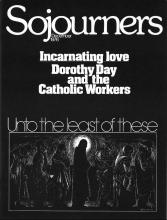On October 7-9, the peace section of the Mennonite Central Committee assembled about 70 persons in Kansas City, Missouri. Many were academicians. Predictably, the gathering tended to resemble a scholarly conference replete with papers and respondents minutely dissecting John Howard Yoder’s The Politics of Jesus in a medley of learned dialects. Author Yoder, responding on the final day, was a bit distressed.
The gathering, he felt, was called not to look backward to Politics, but forward to the challenges facing those who shared its perspective; not to focus on one book, but to begin articulating its themes in other disciplines and ministries: not as a scholarly debate, but as a gathering of the broader believing community, thinking with and encouraging each other for service.
Despite Yoder’s misgivings, this writer witnessed more communal dialogue than what usually goes on at conferences with scholarly input. It was an encouraging sign for those who hope to see theological reflection eventually arising less from individual academicians and more from communities committed to common tasks.
Yoder is primarily a biblical scholar. Politics, he insisted, consists of mere “specimens” from the work of exegetical specialists. Yoder disavowed claims to originality or creativity, beyond that involved in suggesting how these specimens might yield a biblically based socio-political stance.
Politics repeatedly argues that Christian social involvement must be modeled on the lifestyle and teachings of Jesus. But don’t all Christians affirm this? Not at all, says Yoder.
Read the Full Article

